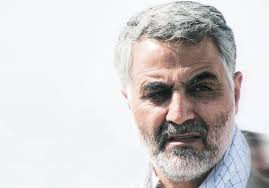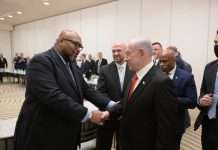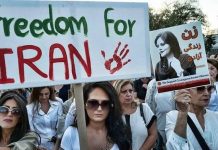A lion in winter
The Econimist/September 06/15
The intriguing eclipse of a military hero
AS IRAN’S most prominent security operative, Major-General Qassem Suleimani has long been respected at home; but as a creature of the shadows. That changed when pictures of him appeared on social media from the battlefields in Iraq, directing the fight against Islamic State and pushing its jihadists back from the approaches to Baghdad. The 58-year-old commander of the Quds Force, the foreign wing of Iran’s Revolutionary Guards Corps (IRGC), quickly became a celebrity, even winning a Man of the Year poll. With Iran keen to project its growing influence in the Middle East, the pictures of General Suleimani were at first tolerated and then actively encouraged in state-run newspapers. He even acquired a parody Twitter account, and some admirers fawningly dubbed him “Supermani”.
This has all changed again. In recent months General Suleimani has all but vanished from view, only appearing this week to give his scheduled annual report on regional affairs to Iran’s powerful Assembly of Experts. Not only are the selfies of him posing with Shia militias now seen as unhelpful, but much of his strategy has also been called into question. “He put too much pressure on Iraq’s Sunnis. There were a lot of complaints about him,” says a political analyst in Tehran.
Chief of the critics, it is said, is Grand Ayatollah Ali al-Sistani, Iraq’s most senior Shia cleric. A public rebuke by the ayatollah, issued on March 13th, followed a series of boastful remarks by the general about Iran’s mighty influence in Iraq, Syria, Lebanon and Bahrain. A private message of concern from Mr Sistani even reached Iran’s supreme leader, Ayatollah Ali Khamenei, according to a well-placed source in Tehran. But it was comments made shortly afterwards attributed to General Suleimani, about the so-called Shia crescent reaching a fifth Arab state, Jordan, that proved the final straw. “He is under the control of a council now and can no longer act as a de facto foreign minister,” the source says.
Saudi Arabia’s push into Yemen this summer also seems to have been part of General Suleimani’s undoing. The Saudi action, at the head of an Arab coalition, came in response to Iran’s involvement in backing and supplying the Houthi rebels, a group that follows a form of Shia Islam and that drove the internationally-recognised government from the country in March. “The Quds Force gave a very bad estimation in Yemen,” says the Tehran source. “They assured the supreme leader that Saudi Arabia would not attack. That is why Mr Rezaei is back in uniform.”
The last-mentioned man is Mohsen Rezaei, a former chief of the IRGC. He tried politics, but failed three times to become president after his retirement from the armed forces in 1997. General Rezaei is regarded in Tehran as reliable, but lacking in charisma; he seems to have been brought back into the IRGC to keep an eye on General Suleimani. “The Quds Force does not have a public-relations department and by its nature is quiet. The pictures were too much, and that’s why the regime stopped them,” says the source.
As General Suleimani has retreated to the shadows, a new front-man with a very different persona has emerged: Mohammad Javad Zarif, the foreign minister. Iran, fresh from a nuclear deal with America and five other world powers, is now favouring diplomacy rather than military action in Iraq and Syria. This being so, it is Mr Zarif who now dominates Iran’s foreign policy—a break with recent years, when General Suleimani was often seen as Iran’s power-broker abroad.
In recent weeks Mr Zarif has travelled to Russia, Iraq, Oman, Qatar, Kuwait, Lebanon and, this week, Tunisia. His latest task, insiders say, is to find an endgame in Syria that limits, rather than increases, Iran’s armed involvement in the civil war there. Tehran admits only to providing military advisers to Bashar Assad’s regime, but several generals have been killed in Syria, along with many soldiers. The cost, in treasure as well as blood, is getting too high.
http://www.economist.com/news/middle-east-and-africa/21663234-intriguing-eclipse-military-hero-lion-winter
Colin Powell, Wasserman Schultz support Iran nuclear deal
September 06, 2015/FoxNews.com/




















